

Notes 200414 090334 d81. In Search Of Age-Friendly Health Care, Finding Room For Improvement. De bêbado e viciado a santo padroeiro dos doentes e dos hospitais. Physician, Know Thyself When Communicating With Cancer Patients. Get unlimited access on Medscape.
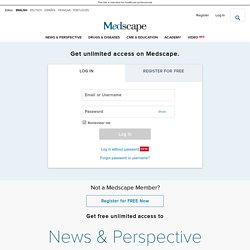
Not a Medscape Member? Get free unlimited access to Breaking News Business of Medicine Expert Perspective Breaking News. Evaluation of Older Adults Hospitalized with a Diagnosis of Failure to Thrive. To Work is to Live Without Dying. At a time when numbing public discourse portrays the two sexes as though they were wearing numbered jerseys of different colors, Rainer Maria Rilke might be balm for exasperated souls.
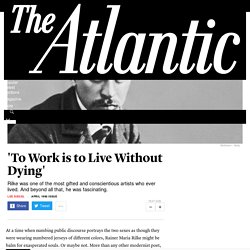
Or maybe not. More than any other modernist poet, Rilke gave ironic, tender, and sometimes despairing expression to the tumult between modern men and women. Lovers. . . . when you raise yourselves and press your mouths together--drink upon drink: strange how each of you drinks your way past the other. But whenever we mean one thing, wholeheartedly, another is right there, tugging on ourfeelings. ASCVD Risk Calculator. We need to talk about ageing. Sheffield University’s Professor of Social Policy and Social Gerontology challenges the assumption that population ageing inevitably means ever increasing health and social care costs, and argues for a radical new approach to tackle ageing and chronic disease throughout our lives so we can live healthier as well as longer: The recent ONS announcement that centenarians are now the fastest growing age group in the UK evoked predictable headlines about the ‘burden’ of old age.
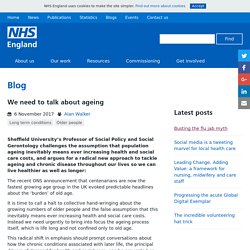
It is time to call a halt to collective hand-wringing about the growing numbers of older people and the false assumption that this inevitably means ever increasing health and social care costs. The Great Prostate Mistake. A book review by Lloyd Sederer: Slow Medicine: The Way to Healing. As much memoir as about clinical medicine, Slow Medicine offers readers the sequel to her nonfiction masterpiece, God's Hotel (2012).
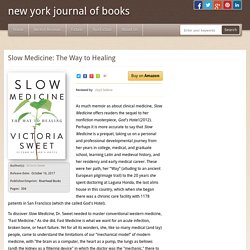
Perhaps it is more accurate to say that Slow Medicine is a prequel, taking us on a personal and professional developmental journey from her years in college, medical, and graduate school, learning Latin and medieval history, and her residency and early medical career. These were her path, her “Way” (alluding to an ancient European pilgrimage trail) to the 20 years she spent doctoring at Laguna Honda, the last alms house in this country, which when she began there was a chronic care facility with 1178 patients in San Francisco (which she called God's Hotel).
To discover Slow Medicine, Dr. Sweet needed to master conventional western medicine, "Fast Medicine. " As she did. Fast Medicine, as Dr. Dr. Whether you are new to or already familiar with Dr. Shared Decision Making and Communication. The effective practice of medicine requires narrative competence, that is, the ability to acknowledge, absorb, interpret, and act on the stories and plights of others.

Medicine practiced with narrative competence, called narrative medicine, is proposed as a model for humane and effective medical practice. Adopting methods such as close reading of literature and reflective writing allows narrative medicine to examine and illuminate 4 of medicine's central narrative situations: physician and patient, physician and self, physician and colleagues, and physicians and society. With narrative competence, physicians can reach and join their patients in illness, recognize their own personal journeys through medicine, acknowledge kinship with and duties toward other health care professionals, and inaugurate consequential discourse with the public about health care. Dr. Atul Gawande: “What are the outcomes that matter?”
Over-diagnosis and over-treatment in Ophthalmology: A review of the literature. Introduction In recent years, the term “overdiagnosis” has been used widely in biomedical literature.
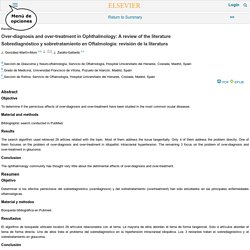
In fact, Pubmed comprises over 500 articles containing this term in their titles, most of which have been published in the past 4 years. Said term is part of a critical current of thought that arose in medicine in recent years. On the basis of the motto “Less Is More”, it aims at reducing the excessive use of some medical actions which are unlikely to benefit the patient and on many occasions cause more damage than good. Overdiagnosis must not be confused with diagnostic errors or false positives. Overall concern about said issue in other areas of medicine has increased to the point that since 2013 a conference is held every year titled “Preventing Overdiagnosis” that brings together experts to discuss the problem. Is Health Care a Right? Is health care a right?
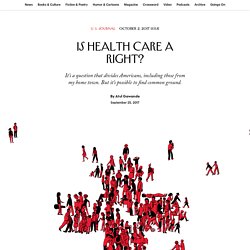
The United States remains the only developed country in the world unable to come to agreement on an answer. Earlier this year, I was visiting Athens, Ohio, the town in the Appalachian foothills where I grew up. The battle over whether to repeal, replace, or repair the Affordable Care Act raged then, as it continues to rage now. So I began asking people whether they thought that health care was a right. Asthma-COPD overlap syndrome: pathogenesis, clinical features, and therapeutic targets. Janice M Leung, assistant clinical professor of respiratory medicine, Don D Sin, professor of respiratory medicineAuthor affiliationsCorrespondence to: D Sin don.sin@hli.ubc.ca Abstract Asthma-COPD overlap syndrome (ACOS) or asthma-COPD overlap captures the subset of patients with airways disease who have features of both asthma and chronic obstructive pulmonary disease (COPD).
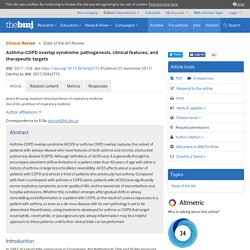
Jamanetwork. Question What advances in diagnosis, prevention, and management of delirium in older adults have been introduced in the last 6 years?
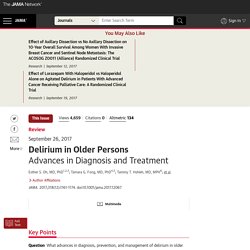
Findings Brief screening tools and improved delirium severity measurement tools have been developed for recognition and risk stratification of delirium. Delirium prevention with nonpharmacologic multicomponent strategies is effective. For pharmacologic management of delirium, the benefits do not outweigh the harms, and recommendations are to reserve treatment for patients with severe agitation that poses safety risks. Meaning Advances in screening and diagnosis of delirium can improve recognition and risk stratification, while implementation of nonpharmacologic delirium prevention strategies can substantially improve outcomes among older patients. Cancer patients need better care, not just more technology. Prashanth Vishwanathan/Bloomberg/Getty A patient awaiting treatment for cancer in an Indian hospital.
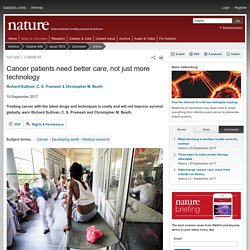
The Fallacy of 'Giving Up' - The Atlantic. "Practicing doctors are a tough group to try and train," he told me. "That's what we've been trying to do for the past 10 years, and we've barely moved the needle. [106] Using Best Evidence for the Management of Hypertension. Elevated blood pressure, commonly referred to as hypertension, is prevalent and has become “big business”. As a result much that is written about hypertension is conflicted and influenced by vested interests. It is thus important to know how to find the least biased evidence. Adding to the complexity, the term “evidence” is used in many different ways with many meanings. This Letter uses the term “evidence” to refer to knowledge gleaned from systematic reviews of randomized controlled trials (RCTs) designed to answer the clinical question of interest.
We use this approach for 4 practical clinical scenarios that cover over 90% of hypertension management issues in a typical primary care practice. Movement as Medicine: The Power of Tai Chi. More Evidence That Contrast-Induced Nephropathy Is Not Clinically Important. Ascopubs. Geriatrics Literature 2016 Year in Review - Willham - 2017 - Journal of the American Geriatrics Society. Taking Anxiety Out of the Physician-Patient Dialogue. New England Programs II: Slow Medicine and Dr Dennis McCullough. Seen the doctor on the Tele? Patient centred care needs to arrive for all, and none more urgent than for our older patients – British Geriatrics Society.
Chris Subbe is a Consultant in Acute, Respiratory & Critical Care Medicine. Indelible Marks: The Practice of Humanity in the Art of Medicine - Outlaw - 2017 - Journal of the American Geriatrics Society. Evidence-Based Deprescribing: Reversing the Tide of Potentially Inappropriate Polypharmacy. Why the BGS Fringe? – British Geriatrics Society.
How doctors choose to die. ‘Catch it early, save a life and save a breast’: this misleading mantra of mammography J R Soc Med 2015 Baum 338 9. Slow medicine: Taking time to practice the art of family medicine. 4 Ways Slow Medicine is Like Slow Food – Aha Media. With patient panels swelling and reimbursements shrinking, many practices face a dichotomy between providing the high-touch, high quality care their patients need and preserving their own financial solvency. Let’s Not Cure Old Age, Slow Medicine Says - California Health Report. File Photo/Thinkstock. Comfort feeding only: a proposal to bring clarity to decision-making regarding difficulty with eating for persons with advanced dementia. The Four Pillars of Alzheimer’s Prevention.
Memory problems come in all shapes and sizes. Some people tend to forget where they put their cell phone, or cannot easily recall names. Una medicina sin prisas para la tercera edad. Hace unos años irrumpió el movimiento slow food, en contraposición al fast food, la alimentación rápida y perjudicial para la salud. Ahora, especialistas de la escuela de medicina de la Universidad de Dartmouth, en Estados Unidos, han acuñado un nuevo término que invita a la reflexión: la slow medicine o medicina sin prisas, que exhorta a los médicos a pensar con tranquilidad antes de aplicar en los ancianos tratamientos que pueden implicar altos riesgos y resultados limitados.
En definitiva, propone reflexionar sobre los excesos de una medicina hipertecnificada en los mayores. En España existen servicios de geriatría, pero aún no son suficientes Casi la mitad de los atendidos en las consultas son mayores de 65 años. Want Control Over Your Death? Consider A 'Do Not Hospitalize' Order. Practical strategies for practising narrative-based medicine. NAS report: Promising but inconclusive evidence on interventions to prevent cognitive decline, dementia. Targeting Unnecessary Meds: A Guide to Deprescribing. When You Teach Prescribing, Also Teach Deprescribing. 859.